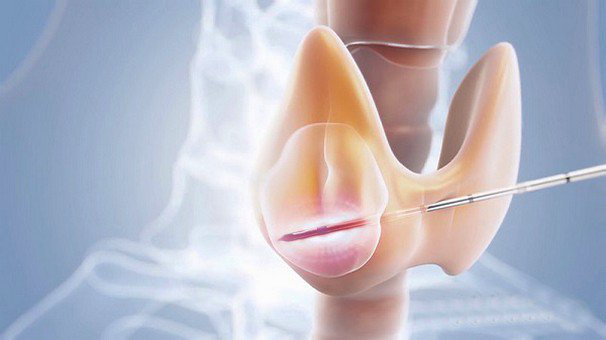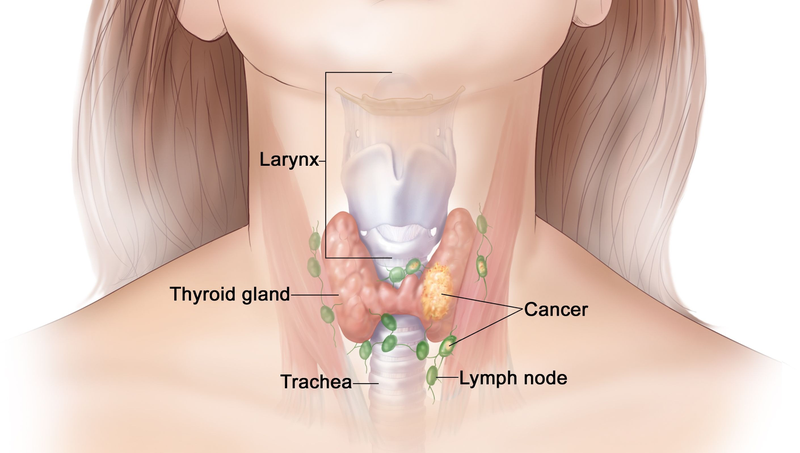Thyroid cancer is one of the cancers that responds well to treatment if detected and treated promptly in the early stages. However, if the disease lasts for a long time, the cancer can metastasize to other parts of the body. So can metastatic thyroid cancer be cured? Let’s find out in the article below.
Before answering the question “Can metastatic thyroid cancer be cured?”, we will briefly learn about metastatic thyroid cancer.
Introduction to metastatic thyroid cancer
Thyroid cancer is a disease in which cancer cells form in the tissues of the thyroid gland. Cancer begins when cells begin to grow out of control. The thyroid gland is located in the front of the neck, below the thyroid cartilage. In most people, the thyroid gland cannot be seen or felt. The thyroid gland produces hormones that help regulate metabolism, heart rate, blood pressure, and body temperature.

Thyroid cancer develops in the thyroid cells.
Thyroid cancer is classified based on the type of cells found in the tumor. It is generally divided into four types:
- Papillary thyroid cancer;
- Follicular thyroid cancer;
- Medullary thyroid cancer;
- Anaplastic thyroid cancer.
Initially, most types of thyroid cancer do not cause any early signs or symptoms in the disease. Therefore, it is difficult to detect thyroid cancer without screening. And this is also the reason why thyroid cancer has enough time to metastasize to other parts of the body.
So it can be said that thyroid cancer testing is an important part of diagnosing and monitoring thyroid cancer. These tests can help doctors determine whether or not there is thyroid cancer, determine the type of thyroid cancer, and monitor the effectiveness of treatment.
There are several different types of thyroid cancer tests, including:
- Thyroid ultrasound: Ultrasound is a procedure that uses sound waves to create images of the thyroid gland. Ultrasound can help your doctor evaluate the size, shape, and appearance of thyroid nodules.
- Thyroid aspiration: A procedure that uses a small needle to remove cells from the thyroid gland. These cells are then sent to a lab to be tested for cancer.
- Blood tests: Blood tests can help your doctor check for signs of thyroid cancer, such as levels of TSH, T3, T4, and thyroglobulin.
- Computed tomography (CT) scan: CT is a procedure that uses X-rays to create images of the inside of the body. CT can help your doctor evaluate the size, location, and extent of thyroid cancer.
- Magnetic resonance imaging (MRI): An MRI is a procedure that uses radio waves and magnetic fields to create images of the inside of the body. An MRI can help your doctor assess the size, location, and extent of your thyroid cancer.
- Thyroid scan: A thyroid scan is a procedure that uses a special radioactive drug to create images of your thyroid gland. A thyroid scan can help your doctor determine the location and extent of your thyroid cancer.

Thyroid cancer can be diagnosed by thyroid aspiration cytology.
Where in the body can thyroid cancer spread?
Here are some of the organs that thyroid cancer can spread to:
- Lymph nodes: Lymph nodes are small organs that protect the body from infection. Thyroid cancer often spreads to the lymph nodes in the neck, but it can also spread to lymph nodes in other parts of the body, such as the chest, abdomen, or groin.
- Lungs: The lungs are the body’s respiratory organs. Thyroid cancer can spread to the lungs, causing symptoms such as shortness of breath, coughing, or chest pain.
- Bones: Bones support the body. Thyroid cancer can spread to the bones, causing symptoms such as bone pain, fractures, or osteoporosis.
- Liver: The liver is an organ that performs many important functions in the body, including metabolism, energy storage, and removal of toxins. Thyroid cancer can spread to the liver, causing symptoms such as fatigue, jaundice, or loss of appetite.
- Brain: The brain is the central organ of the nervous system. Thyroid cancer can spread to the brain, causing symptoms such as headaches, seizures, or vision problems.
- Other organs: Thyroid cancer can also spread to other organs, such as the skin, heart, or adrenal glands.

Thyroid cancer can metastasize to surrounding lymph nodes.
The rate of metastasis of thyroid cancer depends on many factors, including the type of cancer, the stage of the disease, and the patient’s overall health. Papillary thyroid cancer is the most common type and has the lowest metastasis rate. Medullary and anaplastic thyroid cancer have a higher metastasis rate.
Depending on the type of thyroid cancer, the rate of metastasis to other organs is fast or slow. So the question is “Can metastatic thyroid cancer be cured?”.
Can metastatic thyroid cancer be cured?
Whether metastatic thyroid cancer can be cured depends on many factors, including the stage of the disease, the type of cancer, the location of the metastasis, the patient’s overall health, etc.
- Stage of the disease: If thyroid cancer is detected and treated early, when the tumor is still small and has not metastasized, the cure rate can be up to 90%. However, if the cancer has spread to other organs, the cure rate will decrease.
- Type of cancer: There are many different types of thyroid cancer, each with a different prognosis. Papillary thyroid cancer is the most common type, with the best prognosis. Medullary and anaplastic thyroid cancers have a worse prognosis.
- Location of metastasis: The location of metastasis also affects the cure rate. Thyroid cancer that has spread to the lymph nodes has a better prognosis than cancer that has spread to other organs, such as the lungs, bones, liver, or brain.
- Overall health of the patient: The overall health of the patient also affects the cure rate. If the patient is in good health, the chance of responding to treatment will be higher.

Whether metastatic thyroid cancer is curable depends on many factors.
In addition to metastasis, thyroid cancer can also recur despite successful treatment, and it can even come back if you have had your thyroid removed. This can happen if cancer cells spread outside the thyroid before it was removed.
The chance of recurrence is higher if your cancer is advanced or if it grows outside the thyroid. When thyroid cancer recurs, it is usually detected within the first 5 years after the initial diagnosis. The good news is that recurrent thyroid cancer still has a good prognosis. It is usually treatable and most people will be treated successfully.
So we have answered the question “Can metastatic thyroid cancer be cured?”. Hopefully this article can help you in the process of taking care of your health. To get the most accurate answer for each condition, you should see a doctor for examination and advice on treatment.





